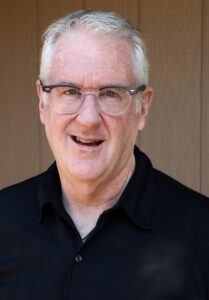
I was standing in the checkout lane at our neighborhood grocery store, waiting to pay while the checker scanned the things in my cart. She’d greeted me with a disinterested “hello,” but then turned to the bagger next to her to talk. And what she talked about, openly, was how sick of her job she was. If only, she said, she could move from her role as a checker in one of the “regular” lanes and supervise the self-check lanes instead, she’d have less interaction with people who drive her crazy. Quite possibly, people like me… And I’m standing two feet away from her.
I felt invisible. Or, more accurate, this woman was utterly home-blind to a customer who heard every word of complaint directed at people just like him…
This dynamic is not reserved for grocery-store clerks—you’ve probably experienced this same awkwardness at many other retail outlets, where the employees seem blind to the customer who’s just a few feet away. I think I understand how this can happen—you’re so exposed to people and all their irritating complications that, eventually, you see them “through a glass darkly.” Customers become “things”—things that lack sensory understanding of language, behavior, and tone.
These customer-service workers are home-blind to the personhood of the people they serve. And by now, you’re probably thinking home-blindness is also an occupational hazard for ministry leaders. And you’d be right. People are beautiful. People are ugly. And everything in between. Because we’ve been invited by God into a people-saturated calling, we must acknowledge its hazards.
When we are home-blind we lose our sense of the “other”—we become so acclimated, maybe even calloused, to the frustrations and challenges of working with people that we slowly lose our attunement to them. The effect is to push people away—to make them feel invisible. And that’s a poison-pill for relationships, undermining the foundations of a thriving community.
The reverse of home-blindness is also powerfully true: simply, we’re drawn to places and to people who “see” us—who not only treat us as if we’re visible, but accentuate and uplift the clouded beauty of who we really are. In short, the feeling of being seen and enjoyed for our embedded “self” is the most powerful redemptive dynamic in the universe. I had minor knee surgery on torn meniscus a couple of months ago. I’m rehabbing on my own with a long list of exercises, but I also made an appointment with a physical therapist to check on my progress. From the moment I met Paxton, my life changed. His energy and delight in meeting me, and his passionate curiosity about my “second life” as an author, filled my soul like breath in a balloon.
The cure for home-blindness is not greater discipline in our interactions with people—we need a deeper source of life than that. Instead, we invite the Spirit of Jesus to fill us with the same enduring, unmoving passion for people that the Trinity has. We need a deep dose of Good-Shepherd-ness… Here’s a few ways I’ve experienced that redemptive energy through Paxton, my physical therapist…
- Treat a person’s details as buried treasure—In most social/professional situations people ask what I do, and I describe the mission of Vibrant Faith. Sometimes I add in that I’m an author. And I’m almost never asked any questions about that. My self-esteem doesn’t require it, but my own passionate curiosity feels disoriented. Why isn’t that interesting to you? Paxton, however, acted like Beyonce had walked into the room when he heard me describe what I do. He asked if I had written a book his nephew would like—he’d buy a copy if I’d sign it. At my next appointment I brought two copies of my daily devotional Jesus-Centered Daily. I signed both of them and gave them to him. He told all his co-workers and texted his sister with a picture of the book. I left that appointment feeling deeply encouraged, even treasured…
- Notice and remember what matters to the person—In my first appointment with Paxton I wore an old T-shirt with one of my favorite bands on the front—Toad the Wet Sprocket. He noticed my shirt early on, and halfway through my regimen on the therapy floor, he said: “Let’s get some music cranking in here! Let’s play some Toad the Wet Sprocket.” He found a playlist on Spotify and turned up the volume in the room. At every succeeding appointment he does the same. It’s a goofy thing that actually marks me as seen and enjoyed.
- Be a relentless source of hope in the person’s life—I came into my physical therapy appointments wondering whether I’d worked hard enough on my recovery. From my first appointment to my last, Paxton has delighted and affirmed all my hard work, and loudly described to the other PT’s in the room how far ahead of the curve I am, and how well I’ve performed on all his PT exercises. To co-opt a popular meme, he’s treated me as if I’m the person my dog thinks I am. Paxton believes in me more than I do, not less.
- Offer something deeper than affirmation—expect much and delight openly in the people you serve—Though Paxton is a perpetual force of positivity in my life, he’s no pushover. He expects a lot of me, and when I prove I can do one hard thing, he ratchets-up the difficulty until he finds my limit. When I surpass his expectations he openly delights in what I’ve done, but quickly follows that with a creative new idea to make things harder for me. This has the dual impact of fueling my perseverance and pushing me to my limits. Both are deeply dignity-giving.
Let’s stir up the “sleeping giant” inside our own soul by inviting the Spirit to animate our interactions with others. And let’s wake up to our own blindness. Jesus came to give sight to the blind—and all of us qualify for that gift…
Just for You!
My new book Editing Jesus is now out. Just click on this link and you can download a pdf of a long excerpt from the book.
Help Is Here!
Fall is on our doorstep, and we innovative, practical resources that will help you infuse your ministry environment with “rich soil” for transformation. Our newest resource is The Sacred Stories Project. This multi-media resource offers your people a simple, safe, and “normal” way to share aspects of their story in natural, genuine ways. And you get a more connected, honest, and “known” congregation. It’s four guided sessions with accompanying video segments from Adam Young, trauma counselor and host of the podcast The Place We Find Ourselves.
And check out our new resource Listening to Jesus Together. It’s a set of six carefully crafted “listening encounters” designed for three people to experience together—online or in-person. The goal is to give people in your congregation a weekly “reminder habit” to help them listen to Jesus in the context of a short-term small-community experience.
Next, Following Jesus is a curriculum resource you can use with both adults and teenagers in your church this fall—help them explore what an ABIDING/REMAINING relationship with Jesus is like. It’s an experiential, highly interactive, co-discovery way to invite people into deeper intimacy with Jesus.
And The Life of Jesus TalkCards is a simple, devotional way to invite small groups into the heart of Jesus.

Rick Lawrence is Executive Director of Vibrant Faith—he created the new curriculum Following Jesus. He’s editor of the Jesus-Centered Bible and author of 40 books, including his new release Editing Jesus: Confronting the Distorted Faith of the American Church, The Suicide Solution, The Jesus-Centered Life and Jesus-Centered Daily. He hosts the podcast Paying Ridiculous Attention to Jesus.
[activecampaign form=5]
 Save your seat for… Home-Centered, Church-Supported Formation Strategies, taught by Dr. Nancy Going. The parents who are part of Vibrant Faith’s 4th-Soil Parenting project are using innovative tools and strategies to explore their own spiritual lives, then learn to better influence their kids toward spiritual growth. Learn what we’re learning about the church’s role in supporting home-centered faith formation. Learn More Here
Save your seat for… Home-Centered, Church-Supported Formation Strategies, taught by Dr. Nancy Going. The parents who are part of Vibrant Faith’s 4th-Soil Parenting project are using innovative tools and strategies to explore their own spiritual lives, then learn to better influence their kids toward spiritual growth. Learn what we’re learning about the church’s role in supporting home-centered faith formation. Learn More Here
